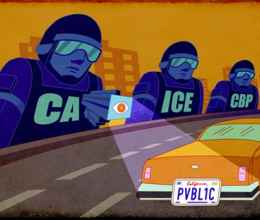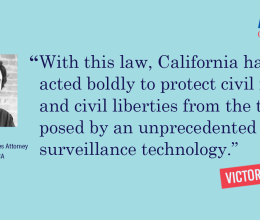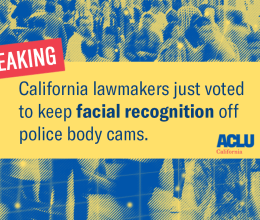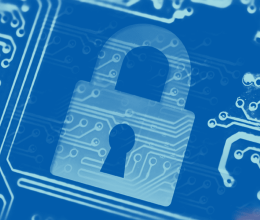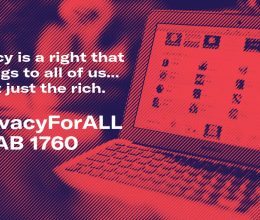What is the Real ID Act?
The Real ID Act is a law signed by President Bush in May 2005, which, if accepted and carried out by the states, would turn drivers' licenses into genuine national identity cards and impose new burdens on taxpayers, citizens, and immigrants.
What would the Real ID Act do?
Real ID would compel the states to standardize drivers' license cards across the nation into a single national identity card and database. It does this by stipulating that state drivers' licenses and state ID cards will not be accepted for "federal purposes" including boarding airplanes or entering a federal facility unless they meet all the law's numerous conditions, which include:
- Standardized data elements and security features on the IDs
- A "machine readable zone" that allows for the easy capture of all the data on the ID by businesses, stores, or anyone else with a reader
- Participation in the construction of a 50-state, interlinked database making all the information in each person's file available to all the other states and to the federal government
- A requirement that states verify the "issuance validity and completeness" of every document presented at motor vehicles agencies as part of an application for a Real ID card
What is the status of Real ID?
The Real ID Act has been passed by Congress and signed into law by the president. But its acceptance in the states is far from assured. The states have only three years--until 2008--after enactment to come into compliance, or their citizens' drivers' licenses will no longer be accepted for federal purposes.
As part of the process, the Department of Homeland Security (DHS) created regulations that spell out in more detail exactly what the states must do to make compliant IDs. In those proposed regulations, the DHS details plans that create a national ID (their specifications speak about the color of the card, the fonts permissible, etc.), are built on "vaporware" databases, that require onerous verification obstacles, and that fail to address privacy concerns, leaving it up to the states to come up with a solution. The DHS also concedes that the cost to states will range from $10.7 billion to $14.6 billion, and citizens will have to cover an additional $7.8 billion, raising the total costs of the Real ID program to a whopping $23 billion!
Why is Real ID bad for our country?
Simply put, Real ID would offer significant costs and disadvantages without any corresponding advantages:
- By definitively turning drivers' licenses into a form of national identity documents, Real ID would have a tremendously destructive impact on privacy. It would become a key infrastructure for, and dramatically accelerate, the surveillance society that is already being constructed in the US. It could be used for the routine tracking, monitoring and regulation of individuals' movements and activities, and could be exploited by the private sector (data aggregators like ChoicePoint, LexisNexis and others build dossiers on individuals; then businesses could sell private data they harvest--by merely swiping the card to prove, say, someone is of legal drinking age--and create a for-profit database, free from even the limited privacy rules in effect for the government).
- The Act imposes significant administrative burdens and expenses on state governments, and would result in higher fees, longer lines, repeat visits to the DMV, and bureaucratic nightmares for some individuals. States would have to remake all drivers' licenses, restructure their computer databases and other systems, create an extensive new document-storage system, and considerably expand their security measures. They would also need to set up an interstate data-sharing network, which would require complex administrative, technical, and security measures...and would take time away from serving their in-state citizens. States would have to verify the "issuance, validity, and completeness" of every birth certificate, immigration document, utility bill, and any other document presented as part of the application. States would be required to expand their DMV payrolls, train employees in areas such as security, document verification, and immigration law.
- Yet Real ID would not be effective at increasing security against terrorism or bring any other benefits that would justify those costs. ID documents do not reveal anything about evil intent. Even with a reliable list of suspected terrorists, the authorities will miss anyone who is not previously known or thought to be a threat. The only real solution is improved intelligence and old-fashioned law enforcement techniques involving the investigation of known evidence.
- Real ID significantly increases the risk of identity-theft. The creation of a single, interlinked database (as well as the requirement that each DMV store copies of all the birth certificates and other documents presented to it) would create a one-stop shop for identity thieves. The security problems with creating concentrated databases have been repeatedly demonstrated over the years--with recent examples being the loss of private information via the Veterans Administration and other government agencies, universities, and private companies like ChoicePoint. Additionally, DMV employees have repeatedly been caught in corruption schemes such as selling fraudulent licenses or data to identity thieves.
How much would Real ID cost?
The short answer is that at this point, no one knows.
There are many factors that must be taken into account by a state in estimating the costs it would face coming into compliance with Real ID. However, because existing technology standards, state administrative structures, and laws within the different states vary widely, Real ID would prove even more expensive for some states than others. For example, state officials in Washington put together an estimate for the act's 5-year cost in their state, which they estimated to be more than $250 million. Virginia's estimates came in at more than $230 million. Taking these estimates to the rest of the states, we come up with a ballpark figure of between $9.1 billion and $12.8 billion.
What's wrong with a national identity card?
The true problem is not the plastic card itself, but the construction of a larger network of identity papers, databases, status and identity checks and access control points.
There is already an enormous and ever-increasing amount of data being collected about Americans today (grocery store "loyalty cards" and Amazon and others monitor our buying habits, airlines keep track of where we fly, etc.). This can be seen as an invasion of privacy, but our privacy has been protected by the fact that all this information still remains scattered across many different databases. But once the government, landlords, employer, or other powerful forces gain the ability to draw together all of this information, our privacy will really and completely be destroyed. This is exactly what a national identity system will facilitate.
A national ID card like Real ID will also facilitate tracking. When a police officer or security guard scans your ID card with his or her pocket bar-code reader, for example, it will likely create a permanent record of that check, including the time and location. How long before office buildings, doctors' offices, gas stations, highway tollbooths, subways, and other transportation systems incorporate the ID card into their security or payment systems for greater efficiency? The end result could be a situation where citizens' movements inside their own country are monitored and recorded through these "internal passports."
Couldn't the DMVs do a better job at verifying our data in the first place?
Ultimately, we should not place too much emphasis on trying to achieve security through improved identification practices. The fact is, identity-based security is not an effective way to stop terrorism. However, before Real ID, something was already being done: a "negotiated rulemaking" process to update the nation's drivers' licenses. That process had brought together key stakeholders (DHS, state officials, vehicle interests, privacy groups like the ACLU, etc.). But the Real ID Act included language that specifically shut down that process, replacing it with a heavy-handed set of requirements for the states that leaves all the key decisions in the hands of ONE of the interests that was represented at that table: the Department of Homeland Security.
What is RFID?
RFID, or Radio Frequency ID, describes an identification card that is embedded with a "tag" loaded with personal identifying information. RFIDs exist or are being proposed for identification cards such as government IDs, school IDs, drivers' licenses, medical benefits cards, and the like. RFIDs make checkpoints and manual ID checks unnecessary, because holders are required to walk through scanners that read the embedded tags and collect the identification information automatically and instantly, much as tollbooths can scan multiple cars traveling at freeway speeds.
As RFID readers (scanners) proliferate, our movements and activities in private and public places will be open to surveillance, by both the government and nefarious identity thieves. This proliferation has dangerous implications for our personal security, since thieves can exploit this no-contact, long-distance communication to steal information (tests have shown that tags can be read from up to 30 feet away, so you would never even know that your information had been accessed). But it also has political and other civil liberties implications. Recently, the Pentagon and the Department of Homeland Security were found to have been conducting surveillance of peace and pro-immigrants' rights activists. Had a national identity card with RFID technology been in place, agents could simply scan a building from the outside where activists were meeting and immediately learn the identities of everyone in attendance. This type of surveillance possibility, like the increased incidences of cameras cropping up on street lamps and buildings all over the country, smacks much too strongly of a Big Brother society than any of us who believe in the First Amendment's guarantee of "the right of the people peaceably to assemble" can tolerate.
What can be done about Real ID?
State legislators, interested citizens, and other individuals can join with the many governors and interest groups who oppose this legislation, and can force Congress to repeal and/or rework the legislation. Three states have already rejected the program: Maine, Idaho, and Arkansas, and bills rejecting Real ID have also been introduced in Arizona, Hawaii, Illinois, Kentucky, Maryland, Minnesota, Missouri, Nebraska, New Hampshire, Oklahoma, Rhode Island, South Carolina, Washington and West Virginia. Similar legislation has been passed by one chamber in the legislatures of Arizona, Georgia, Montana, New Mexico, Utah, Vermont and Wyoming. With even only a few states refusing to make Real ID-compliant drivers' licenses for their citizens (an entirely lawful option), the system envisioned by its sponsors will be thrown into crisis, further pressuring Congress to revisit the issue--this time with proper democratic consideration and debate.


